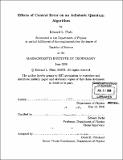| dc.contributor.advisor | Edward Farhi. | en_US |
| dc.contributor.author | Platt, Edward L | en_US |
| dc.contributor.other | Massachusetts Institute of Technology. Dept. of Physics. | en_US |
| dc.date.accessioned | 2007-02-21T11:29:37Z | |
| dc.date.available | 2007-02-21T11:29:37Z | |
| dc.date.copyright | 2006 | en_US |
| dc.date.issued | 2006 | en_US |
| dc.identifier.uri | http://hdl.handle.net/1721.1/36123 | |
| dc.description | Thesis (S.B.)--Massachusetts Institute of Technology, Dept. of Physics, 2006. | en_US |
| dc.description | Includes bibliographical references (p. 59-60). | en_US |
| dc.description.abstract | Noise in adiabatic quantum computation can be modelled as a perturbation of the problem Hamiltonian. For a type of noise called control error, the perturbation can be considered to have the same structure as the problem Hamiltonian. If the problem Hamiltonian, and therefore the noise, are 2-local, then the result of the adiabatic algorithm can be simulated somewhat more efficiently than an algorithm with an arbitrary problem Hamiltonain. Using optimized numerical methods, I present an analysis of the effect of 1-local and 2-local control error on the success of an adiabatic algorithm that solves the agree problem. Furthermore, I examine how the maximum allowable noise, or success threshold, scales with the number of qubits. These analyses suggest the existence of a minimum success threshold for the particular algorithm considered in the presence of only 2-local noise on an arbitrarily large number of qubits, as well as a polynomial decrease in success threshold with the number of qubits. | en_US |
| dc.description.statementofresponsibility | by Edward L. Platt. | en_US |
| dc.format.extent | 60 p. | en_US |
| dc.language.iso | eng | en_US |
| dc.publisher | Massachusetts Institute of Technology | en_US |
| dc.rights | M.I.T. theses are protected by copyright. They may be viewed from this source for any purpose, but reproduction or distribution in any format is prohibited without written permission. See provided URL for inquiries about permission. | en_US |
| dc.rights.uri | http://dspace.mit.edu/handle/1721.1/7582 | |
| dc.subject | Physics. | en_US |
| dc.title | Effects of control error on an adiabatic quantum algorithm | en_US |
| dc.type | Thesis | en_US |
| dc.description.degree | S.B. | en_US |
| dc.contributor.department | Massachusetts Institute of Technology. Department of Physics | |
| dc.identifier.oclc | 72455126 | en_US |
